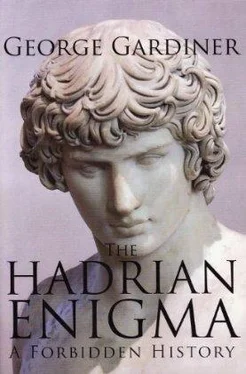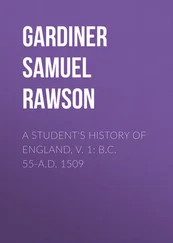George Gardiner - A Forbidden History.The Hadrian enigma
Здесь есть возможность читать онлайн «George Gardiner - A Forbidden History.The Hadrian enigma» весь текст электронной книги совершенно бесплатно (целиком полную версию без сокращений). В некоторых случаях можно слушать аудио, скачать через торрент в формате fb2 и присутствует краткое содержание. Жанр: Исторические приключения, на английском языке. Описание произведения, (предисловие) а так же отзывы посетителей доступны на портале библиотеки ЛибКат.
- Название:A Forbidden History.The Hadrian enigma
- Автор:
- Жанр:
- Год:неизвестен
- ISBN:нет данных
- Рейтинг книги:5 / 5. Голосов: 1
-
Избранное:Добавить в избранное
- Отзывы:
-
Ваша оценка:
- 100
- 1
- 2
- 3
- 4
- 5
A Forbidden History.The Hadrian enigma: краткое содержание, описание и аннотация
Предлагаем к чтению аннотацию, описание, краткое содержание или предисловие (зависит от того, что написал сам автор книги «A Forbidden History.The Hadrian enigma»). Если вы не нашли необходимую информацию о книге — напишите в комментариях, мы постараемся отыскать её.
A Forbidden History.The Hadrian enigma — читать онлайн бесплатно полную книгу (весь текст) целиком
Ниже представлен текст книги, разбитый по страницам. Система сохранения места последней прочитанной страницы, позволяет с удобством читать онлайн бесплатно книгу «A Forbidden History.The Hadrian enigma», без необходимости каждый раз заново искать на чём Вы остановились. Поставьте закладку, и сможете в любой момент перейти на страницу, на которой закончили чтение.
Интервал:
Закладка:
The third was of Amun, the chief divinity of the old Egyptian pantheon, but here in the guise of Ammon, a Greek adaptation of Amun into Zeus Ammon, the highest god.
Between these three icons, Suetonius estimated, the entire mythology of Egypt's archaic religion was encompassed and dressed with an acceptably Roman face. Their divinity was expressed in human figuration, not the fantastic menagerie of grotesque animals Egyptians revere. Had these priests, he wondered, decided it was time to update their imagery for wider consumption? He sensed there was more to this occasion than met the eye.
A fourth pediment lay bare, its platform naked of any deity. Suetonius wondered at its implication.
The priests lowered the bier to the flagstones beside a low podium paved in glazed faience tiles. Antinous's pallid, unearthly hue now became the focus of the shrine. Torch light was reflected off polished mirrors to stream a shower of beams onto the bier, highlighting its occupant.
As the assembly silently filed into the chapel and arranged itself around the tiled podium, the two senior priests Pachrates and Kenamun intoned melodious incantations and wafted incense censers towards the bier. Meanwhile Horse Guards and Praetorians took defensive positions around the chamber as the assembly rambled to a halt.
Two grandiose thrones of ivory and precious stones worthy of Pharaohs were standing to one side. They were accorded to the Imperial couple as Pachrates performed fluid oriental genuflections of obeisance. Hadrian and Sabina took their seats while Geta, Arrian, Macedo, Commodus, Balbilla, and other notables arranged themselves close by.
A gigantic platter of beaten gold embossed with arcane symbols was carried by two priests and placed onto the faience-tiled podium. Suetonius did not think he had ever before witnessed so large a single object in pure mellow gold even among the lavish trove abducted from the Temple at Jerusalem generations ago and still displayed at Rome. The sheer weight of the platter required two men to carry it to the platform. This gleaming treasure must have been worth a nation's ransom.
A hush fell across the throng as it awaited the Pontifex Maximus to make his presence and purposes known. The corpse of the Bithynian youth lay in calm ceremonial repose.
The Special Inspector was impressed how, in such a parched climate, the cadaver appeared to retain its normal shape, textures, and color. Neither bloating, mottling, nor corruption was discernable, and only the pungent odor of blue lotuses and wafting incense exuded across the space. Mortician Kenamun was certainly a master of his craft.
Pachrates, ever the showman, took his staff of office and brandished it majestically before the bier. He wafted the wand across Antinous while chanting mysterious formulae towards Ammon as he tossed handfuls of grasses of wheat and barley into the air. His gestures implied some ancient holy harvest rite of truly awesome sanctity, which none of those attending either understood or heeded.
Two of his assistants removed from the bier two of the clay canopic jars which lay alongside the body. Unplugging the stopper of the first, one assistant carefully poured the contents into a shallow indent at the rim of the golden platter. A visceral internal organ the size of a pomegranate, glistening with emollient, plopped into the platter with an audible slurp.
On unplugging the larger jar and tipping its contents onto the basin proper, a bundle of well-oiled variegated tissues slid and tumbled into the centre of the dish with an unctuous slush. Everyone in the chamber immediately realized their origin. The first was a human heart and its connective veins; the second was the intestinal complex of gut, stomach, and associated tubes.
Caesar sunk back heavily into his ivory throne, his discomfort palpable.
Pachrates assumed an air of great solemnity and waved his staff over the viscera with profound gravitas. He uttered loud incantations in the old liturgical language in a harshly guttural voice. Handfuls of igneous powder were tossed into braziers, making flashes of flame and fume spurt into the chamber's gloom. The bursts projected multiform shadows in a neurotic dance upon the surrounding pillars. Their reeks sank into nostrils and invaded the bloodstream.
When he had performed this spirited display the priest peered closely at the glistening innards lying on the platter to give the tissues a studious inspection with the tip of an ivory pointer. Prodding carefully at the entrails, he nodded appreciative mutterings to himself and shared approving glances and mutterings with Kenamun. The assembled priests voiced choral responses confirming his wise discernments in their native language.
Suddenly with a gasp and an exclaimed "Yes, by Amun!" he sighted something significant among the fleshy debris. It demanded closer inspection.
Calling on Kenamun to respectfully hold a section of delicate gut to a lamp between his fingers, Pachrates peered closely at a bump in the connective tube of an organ. He reached to the innards and rolled the bump delicately between his venerable priestly digits.
"Yes!" he cried in his heavy-accented Latin, "A miracle, my lord! Great Caesar of the Romans, please allow me permission to incise your companion's remains to retrieve a special boon of the god Osiris himself."
Hadrian grudgingly nodded to Macedo to inspect the priest's claim. Macedo, not usually squeamish about matters involving corpses, moved to see what Pachrates was talking about. He gingerly fingered the intestine at the place the priest was holding, and turned to Hadrian with some apprehension.
"Caesar, there appears to be a scarlet jewel within the entrails," he announced. Do you wish me to retrieve it?"
"The gut is sealed by Nature's hand, so it can't have been inserted into the tissue," Pachrates declared.
Hadrian again tiredly nodded. Macedo took his hip dagger and carefully incised the diaphanous tissue. Something small and hard popped out into his hand. A priest came forward with a small bowl of perfumed water and a towel to rinse the object, which was then passed carefully to Pachrates. Pachrates held the object high between finger and thumb to the light of the nearest torch to inspect its features closely.
He turned to Hadrian and uttered an impressive exclamation in his inscrutable language while holding the object high to display to the assembled notables.
"Great Caesar, your humble servant of Amun, Pachrates, Sage of Heliopolis, offers proof to vindicate the death of the youth Antinous. In divining the auspices of the entrails of the young man I see no messages of despair or disease or death. No, not at all. I see no imperfection, no dire omens, no divine warning. I see nothing but health and wholesomeness, healing, and future hope!"
Pachrates paused to assess the effect of his pronouncements upon the assembly. Their eager eyes and engrossed attention were very winning.
"Yet further Caesar, on inspecting these entrails more intimately I discover this miraculous trophy. Concealed within the entrails at a place no mortician can reach, inches beneath the heart of the boy, lies a blood-hued gem generated spontaneously within the organs of the youth. Behold! I raise it high!
It is a likeness of the god Osiris himself fashioned as a blood jewel. It is just as our ancients prophesy of a Nile sacrificial drowning! The youth's own bloodstream has transfigured into an icon of the god Osiris himself! Within the very organs of the drowned victim is the visible sign that the youth metamorphed into the god Osiris, the Dionysus of Egypt, the dying and reborn god of the seasons! It is a holy, sacred apotheosis!"
Pachrates was warming to his role. His voice rose higher in increasingly joy.
"Through the death of the mortal Antinous our god Osiris resurrects again on the third day! Osiris is reborn in Antinous! Antinous is reborn as Osiris! Antinous is sanctified as Divus! Divine-like! The youthful vitality of Antinous transmutes into the lifeforce of Pharaoh! Praise to the life-giving boon of Antinous-Osiris of Egypt!"
Читать дальшеИнтервал:
Закладка:
Похожие книги на «A Forbidden History.The Hadrian enigma»
Представляем Вашему вниманию похожие книги на «A Forbidden History.The Hadrian enigma» списком для выбора. Мы отобрали схожую по названию и смыслу литературу в надежде предоставить читателям больше вариантов отыскать новые, интересные, ещё непрочитанные произведения.
Обсуждение, отзывы о книге «A Forbidden History.The Hadrian enigma» и просто собственные мнения читателей. Оставьте ваши комментарии, напишите, что Вы думаете о произведении, его смысле или главных героях. Укажите что конкретно понравилось, а что нет, и почему Вы так считаете.












